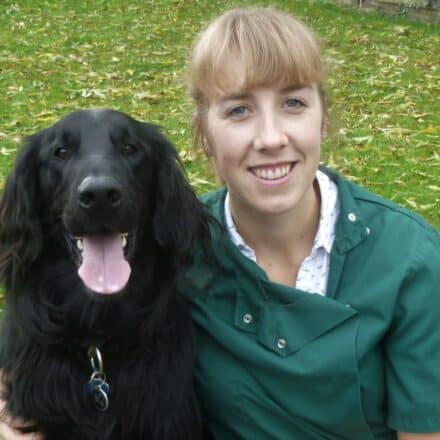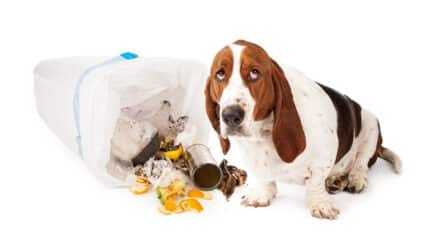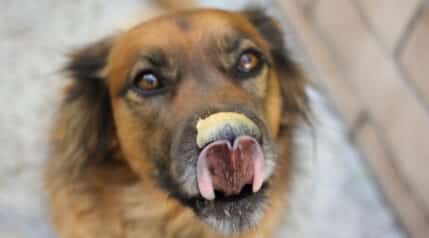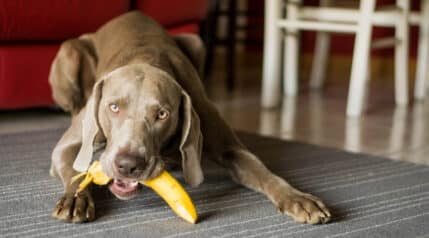You might have seen the iconic Lady And The Tramp movie poster and two dogs sharing a plate of pasta. Cartoon characters eating carbs are one thing, but what about real canines?
Spaghetti is a type of long thin pasta that many people enjoy in various dishes and sauces. But what happens if your dog eats spaghetti? Could it cause problems, and what should you do? This article explores this further, answering all your questions on dogs and spaghetti.
Let’s dig into the facts, and we’ll dish up the truth when it comes to letting your dog slurp down spaghetti and whether it’s a good idea or not.
Is It Okay For Dogs To Eat Spaghetti?

Spaghetti is not harmful to dogs if fed only occasionally and served plain. It can be a useful way of adding a bit of variety to your dog’s diet if you feel he needs it, without causing too many problems. However, there are issues if your dog eats substantial quantities of pasta or if he eats it coated in sauce.
Is It Good For Dogs?
Spaghetti is not particularly ‘good’ for dogs. When served cooked and plain, it is unlikely to cause any harm to your dog. But it is also unlikely to give them many beneficial nutrients either. Spaghetti is made from flour and water. The flour provides starchy carbohydrates, which are a valuable energy source but add extra calories to their diet, and there aren’t many other nutrients in pasta generally.
Whole wheat pasta delivers more to your pet than refined white pasta, which is why people are advised to eat it too. Wholewheat pasta provides fiber that helps with healthy digestion and releases energy more slowly, avoiding blood sugar spikes. So, it’s worth considering wholewheat pasta as a healthier option.
When Is Spaghetti Bad For Dogs?

Spaghetti could cause more problems for your dog if he has eaten it raw. Uncooked pasta can swell when it comes into contact with the moisture in your dog’s stomach. This could make them feel overfull and bloated, which can be uncomfortable and contribute to vomiting and diarrhea.
Certain spaghetti sauces could cause your dog to become unwell too.
These include:
Onions
Onions can cause oxidative damage to the red blood cells in dogs, which makes them fragile and likely to burst. Destruction of red blood cells in this way can cause the dog to become anemic. Your dog might become weakened as oxygen can’t be delivered around the body as effectively.
Anemic dogs also have pale gums, an elevated heart rate, and could even collapse. These symptoms take a few days to develop. So, your dog might seem okay immediately after consuming onions, but things may deteriorate over time.
Dogs can become sick by eating a moderate amount of onion in one sitting or eating small amounts regularly. You should avoid giving your dog any leftovers that might contain this vegetable, even if it’s in small quantities.
Garlic
This is another member of the allium group of plants, so it has a very similar toxic mechanism of action to onions. Many pasta dishes contain garlic, so this could be problematic if your dog eats them. As well as garlic in the pasta sauce, garlic is found in one of the most popular side dishes to pasta – garlic bread.
The crust is unlikely to cause many issues. A whole stick of garlic bread could be problematic. As with onions, symptoms won’t be seen straight away and take a few days to develop, so even if your dog seems fine now, take them to a veterinarian immediately if they’ve eaten garlic.
Meats
Spaghetti dishes often contain fatty meats to add flavor. Carbonara, for example, features bacon or pancetta, which are salty, high-fat meats. Small amounts shouldn’t cause too many problems, but a significant quantity could cause real trouble. Digestive upsets, including vomiting and diarrhea, could occur. In some cases, more serious pancreatitis (inflammation of the pancreas) could develop due to the high levels of fat contained in these foods.
Ground beef or pork mince in Bolognese or lasagna is also quite fatty and could cause similar issues.
Cheese, Cream, and Butter
Many dogs can eat dairy products without issue, while others may experience severe tummy upsets. This happens because some dogs can’t digest lactose, a sugar that is naturally found in cream and butter.
Some dogs may show no symptoms of digestive issues, but others can have pronounced vomiting and diarrhea. Pancreatitis could also be triggered by the high-fat levels contained in these ingredients requiring intensive veterinary treatment. Some dogs with underlying allergies to milk proteins may have a flare of their symptoms, too, causing red and itchy skin.
Even if your dog can tolerate milk and dairy products okay, you should probably avoid feeding your dog too much as it adds extra calories to his diet. This could lead to weight gain over time.
Chili Peppers
Some pasta dishes have quite a spicy sauce containing chili flakes or chili peppers. Chilis are not toxic to dogs. However, they contain something called capsaicin, which affects digestion and can make dogs feel unwell. Some dogs can have vomiting, diarrhea, and stomach cramping after eating spicy foods.
What Should I Do If My Dog Ate Spaghetti?

If your dog has accidentally eaten a few small pieces of spaghetti or other pasta, then this is unlikely to cause any problems. However, if your dog has eaten a lot, or consumed sauce with harmful ingredients in it, then you should take the following steps:
- Remove your dog from the area. If your dog raided the groceries or cupboards, remove him from the room while you clean up. This prevents them from eating anymore and allows you to collect the evidence. Could your dog have eaten some of the packaging as well as the pasta? Was it dried pasta, or was it cooked pasta from a microwaveable ready meal? Did he steal the meal you had just made for yourself?
- Check your dog. Is your dog okay? Any signs of digestive upset or bloating?
- Call your veterinarian for advice. If you think your dog has eaten a large quantity of spaghetti or consumed any pasta sauce with potentially harmful ingredients like onions or garlic, then call your veterinarian for advice. It would be useful to try and tell them roughly how much you think your dog has eaten, the approximate size or weight of your pet, and how long ago he ate it.
- Follow your veterinarian’s advice. If they would like to check your dog over, make sure you promptly bring them to the clinic. Follow their advice and any treatment recommendations for the best possible outcome for your pet.
- Prevent future accidents. Make sure you store your groceries well out of reach from your pet or secured in cupboards in the future. Don’t leave any plates of food within your dog’s reach.
Will My Dog Be Okay?
We don’t recommend it regularly, but occasionally, a little bit of spaghetti should be fine for most dogs. However, if they have eaten a large amount of pasta, either cooked or raw, this could cause issues.
Problems are most likely to occur in dogs that have eaten very rich, creamy, or fatty dishes, leading to vomiting, diarrhea, or pancreatitis. Similarly, if they swallowed a meal heavy in garlic or onions, seek veterinary attention immediately to stop dangerous hemolytic anemia from occurring.
What Will My Veterinarian Do?

Your vet might triage your dog over the phone and decide you can monitor your pet at home. However, if they have any concerns, they might ask you to bring your dog into the clinic to examine your pet. Depending on their findings, they may suggest medication to induce vomiting. This helps your dog to bring up the spaghetti and any other toxic ingredients, like onions, to prevent digestion and toxicity from occurring. This is often the treatment of choice if your dog is brought into the clinic quickly enough before he’s had a chance to digest his meal.
Hospitalization with intravenous fluids could be recommended to help counteract any dehydration and keep your dog’s blood pressure up. Other tests and treatments may be required depending on your dog’s condition. Your veterinarian should keep you updated with your dog’s progress and any recommendations for diagnostics or treatment, but if you have questions, please don’t hesitate to ask them.
Frequently Asked Questions
Can a dog die from eating spaghetti sauce?
It would be rare, but it’s possible, depending on what the sauce contains. High levels of onions and garlic could cause dangerous anemia in your dog, which could be fatal, especially if not treated. Other sauces containing high fat levels could trigger pancreatitis in some dogs, a very serious illness.
Is it okay for a dog to eat a noodle?
Both spaghetti and the noodles found in Asian dishes are very similar. They tend to be made from flour, water, and possibly egg, so eating a plain noodle is unlikely to cause adverse side effects. But very large quantities of noodles or consuming an Asian sauce with garlic, onions, or high-fat foods could cause problems for your pet.
Can dogs eat garlic bread?
No, it is not recommended for dogs to eat your side of garlic bread. The odd piece is unlikely to do too much damage, but garlic can cause hemolytic anemia in dogs, so it is best to avoid it. Garlic bread contains minimal beneficial nutrients for dogs, adding only extra calories leading to weight gain.
Final Thoughts
While small amounts of plain cooked pasta are acceptable for most dogs, you shouldn’t allow your pet to eat pasta dishes that contain large amounts of sauce. This is where the problems start to occur. Ingredients like onions, cream, and fatty meats can cause digestive upsets and more serious conditions like pancreatitis and anemia. Call your veterinarian for advice if you have any concerns about your pet. It is best to get them checked out promptly as any treatment required is more likely to be straightforward this way.





